Tumpline February 2015
Published: Sat, 02/28/15
Get news, announcements, and the latest camp scoops in our newsletter. View a web version of this issue
 |
|
 |
    |
 |
|
Maison-de-Pierre, 1957 Part III Andy Webster
John Blachford drove up to Camp Nominingue on a Friday and by noon, the next day, we had decided to embark on a more ambitious canoe trip than either of us had ever been on. This decision on my part meant that I must quit my counselling job, but the money I would have to forfeit was inconsequential when I compared it to the overall experience of the trip we were to take. The following is an account of the 14 days we spent out in the bush. Thursday, August 8 The next morning, the air was cool and fresh, and the sun was bright, but not as hot as the day before. Going back into the bush for firewood, I saw a partridge perched on a low branch of a tree. I ran back to the cabin and fetched the machete. I crept up very slowly and carefully towards the partridge. I made some noise doing this and was surprised that the partridge did not move. I thought that maybe the bird was still asleep. When I threw the machete at him, missing by at least a foot, he woke up pretty quickly and flew to a tree 25 yards away. We didn’t have partridge for breakfast! We had some very good back-bacon though, with porridge and cocoa. At 9:00, we pushed the canoe into the crystal-clear mirror-like lake and searched around for the river which would lead us to the portage into Lake Marrol. We found the river after half an hour and portaged into Lake Marrol, to Lake Garrow, to lake of the Narrows, to Belisle and along a small, unnamed river with four short portages around rapids into our destination for that day, Lake Mazana. We had had lunch on Lake of the Narrows, on a small blueberry bush-covered island. The trails we had crossed that day were well-marked an, for the most –part, easy to follow.  Where our trail entered Lake Mazana, we discovered that lumbering had been going on, probably during the last winter. We explored an old lumber camp which we found was very dirty and, on a table in one cabin, we were disgusted by the sight of an old, rancid piece of butter. Paddling up Mazana, it began to rain and it was about 5:00, but we decided to push on up the lake to a campsite Mr. Van Wagner had pointed out to us on the map. Approaching the camp site, we saw an old Indian in a canoe, paddling with short, jerky strokes. He was with his wife and small child. I talked to the old man in French, but my Fraench wasn’t too good and neither was his, so we didn’t learn anything except that he was on a fishing expedition. Paddling away, John and I imitated the short, choppy Indian stroke, and more or less adopted this paddling style for the rest of the trip, since we wound it was faster than the long, easy gliding motion that we had learned previously. The Indians, we found, used their bodies when they paddled, leaning sharply forward with each stroke. The technique we had learned dictated that the best stroke was one in which trhe body did not move; only the arms. 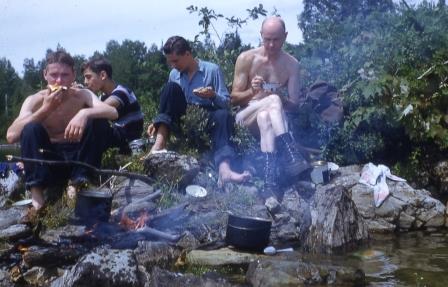 We arrived at the camp site, which was very overgrown with tall grass. John cleared the grass with several well-aimed strokes of the machete, and we set up camp. Coming up the lake, we had stopped on a point in the rain, which we discovered was a recently used camp site. There were American beer can, paper and other cans strewn widely and thickly over the site. We supposed that an American fishing party had flown in and had indiscriminantly used what must have been a good camp site. This was not the site we stopped at, though. We stopped at the one further up the lake where Mr. Van Wagner had suggested. That night, while having supper in the semi-darkness, we speculated as to what we would see at the Manuan Indian reservation and Hudson Bay post which we had been told was right across the lake from the reservation. Snake and Frog Jim Tilley
From Lessons from Summer Camp Jim Tilley earned a doctorate in physics from Harvard and worked on Wall Street for twenty years. The first two collections of his poetry were published by Red Hen Press - In Confidence in 2011 and Cruising at Sixty to Seventy in 2014. During the summer of 2013, he returned to Camp Nominingue for the first time since the 1960s. A result of that return visit is his forthcoming collection, Lessons from Summer Camp, from which this poem is taken. Lessons from Summer Camp will be published in Spring 2016.  Snake and Frog We’d congregated on the beach, none of us willing to intervene, too intrigued to see how Nature’s predator and prey would work things out. Most of us rooted for the frog as it was slowly ingested— so slowly that it seemed as if the snake doubted itself, that maybe it had realized its eyes were bigger than its stomach, better to disgorge the creature before it became a fat knot stuck in the throat. Some of us lost interest and continued towards the Senior Swim Area, content to let our more bloodthirsty friends reveal the outcome later, but most of us remained, a few ophiophilists (snake-lovers) changing their allegiance as less and less of the frog showed. All the while, the frog remained cool, didn’t struggle to escape, exhibited no signs of distress as the snake “sucked in” one leg and then the other, working its way bit by bit up the abdomen until only the frog’s head protruded from the snake’s maw. And then— the reason that one should always stay to the end—without any warning, when the snake must have sensed the game was over, that it had won the contest of wills and was perhaps a little greedy for results, the snake opened its jaws wide, and the frog, as if it knew its time would come, leapt free and kept leaping, clever enough to stop only when safely aboard a lily pad in the bay, where there was time enough to assess the damage while digesting the lesson it had just learned. 
Coming of Age (Part I) Hay Finlay
From the Totem Pole Voice of the CNCA Spring 1945“Today, I am a man!” Yes, at last, Camp Nominingue has come of age, having come into being 21 years ago this summer. And speaking on its behalf, I feel I can say the foregoing fervently. It was in 1923 and 1924 that Van and I, both having had many years experience at running camps for other people, conceived the idea of organizing and administering a camp of our own. 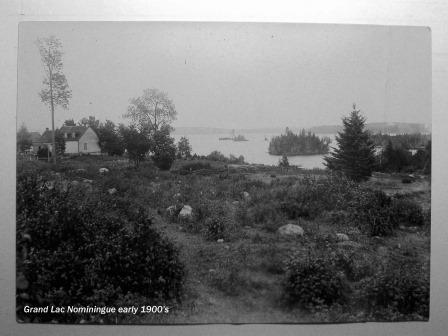 Our first step was to get a line on available sites. This was done mainly through the tourist agents of the CPR and the CNR. Actually, the finding of a suitable site was our biggest problem. Not that there were too few, but that we were very exacting in our requirements. They were, as I recall, a sandy beach, a grove of trees for shelter from the sun, sufficient elevation above water level to ensure good drainage, enough cleared land to provide space for tennis courts, playing fields, etc. After some time, along came a multitude of letters from the various agents outlining the proposed sites in their localities. We separated the possible from the impossible, and over the weekends visited those which seemed promising. Many attractive sites were visited and we finally weeded out two of them – one on Ile Major below Mont-Laurier on the Lievre River and our present site on Nominingue. When we finally chose Nominingue, it was amusing to note, although we hardly looked like financial magnates, that the local people suspected that we represented the CPR, McGill University, or a big hotel project of some sort. It was with some difficulty that we disabused them of the idea, and even now, I doubt if we were entirely successful.  Upon choosing our site, the question of price naturally arose. The owner, Mr. Alderic Charbonneau, was as shrewd as the average French-Canadian, but since Van is an American-Dutchman and I a Scot, we felt that we could be just as shrewd. Thus, we began our bargaining. Finally, after a show of disinterest and a cooling off period, we got the property at a not too exorbitant price. In the fall of 1924, the clearing and construction of the camp began. Those who know the camp of today can have no conception of the place then. The lower campsite was all bush. There had been a forest fire about 25 years previously, followed by a big wind, so that all the burned trees were strewn all over the ground – there were some pretty big ones too! A second growth of young birches had sprung up and covered the place.  A space from the present lodge to about halfway to the flagpole was the extent of the clearing then. Beyond was impenetrable until we cleared a path for our council ring, which was where tent #9 now stands. We constructed our first tennis court by hauling clay from down by the swimming site. Each weekend, Van and I made the trip to Nominingue and got to work. Finally, a modest camp was erected, consisting of a Main Lodge, screened in to form a dining hall on the balcony, and three tent platforms. 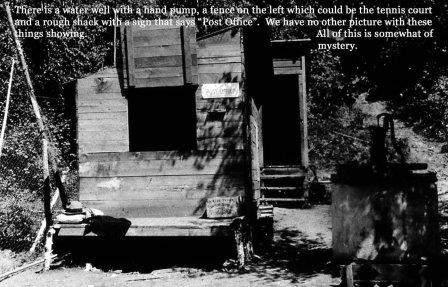 Our next problem was to “sell" the camp to parents of suitable campers. As is always the case, the first year was the hardest. Our first folder was a two page affair, filled with pictures we had to borrow from the CPR, because we had none of our own, as yet. After many interviews and phone calls with interested and uninterested parents, we finally got our first camper, Rodney Patch. With one camper enrolled, the task of getting a few more became easier. We finally ended up with 11 campers that first summer. 2015 Winter Events – Évènements cet hiver
Parent and Son Information Evenings at 7:15 PM (For new and prospective campers and their families) Tuesday March 24 Lower Canada College NDG Tuesday March 31 Chimo Hotel Ottawa Wednesday April 22 Chimo Hotel Ottawa Thursday April 23 Lower Canada College NDG Tuesday May 12 Lower Canada College NDG Thursday May 14 Chimo Hotel Ottawa If you are interested in any details concerning these events, please contact us at the camp office. 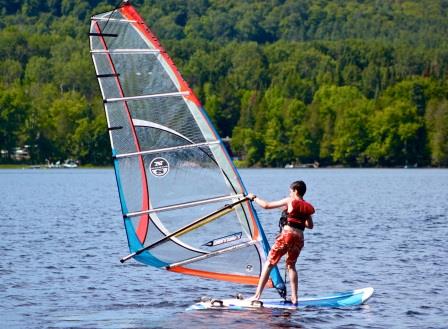 Soirées d’informations pour parents et garçons à 19h15 (Pour nouveaux campeurs inscrits ou intéressés) mardi 24 mars Lower Canada College NDG mardi 31 mars Hotel Chimo Ottawa mercredi 22 avril Hotel Chimo Ottawa jeudi 23 avril Lower Canada College NDG mardi 12 mai Lower Canada College NDG jeudi 14 mai Hotel Chimo Ottawa Pour plus de détails, svp contactez le bureau du camp. Alumni Association News / Nouvelles de l’association des anciens
On Saturday, January 24, I attended la Coupe des fondeurs in Saint-Jérôme with my daughter who was skiing for the Viking Ski Club. Two current Camp Nominingue campers were racing for the Club des Fondeurs, Felix Toulouse and Francis Lutfy. Both skiers did well with Francis qualifying for the Quebec Winter Games, where he will represent the Laval region. Congratulations to both skiers!Sad News Joan Pollock, wife of long-time Nominingue business manager Gordon Pollock, died peacefully on February 16, 2015. She was mother to Nominingue campers and counsellors, David and Ross, and daughter Lesley. 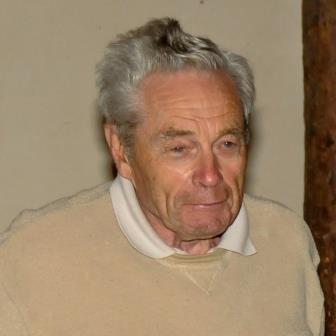 On February 24, 2015, at the age of 91, Dave Wood passed away after a brief illness. Although maybe better known for his long career as a teacher and coach at Lower Canada College in Montreal, Dave Wood spent his summers up at Camp Nominingue. He served as a member of the Senior Staff for 25 consecutive years, from 1956 to 1980. He was director of Lower, Intermediate, and Senior Camps, as well as program director and finally business manager. He was a dedicated professional who was always prepared to do whatever was required to make Nominingue a better place. In 2009, he was nominated as a “Pillar of Camp Nominingue.” Visitation will take place on March 6, 2015 from 2:00 - 5:00 and 7:00 - 9:00 at Rideau Memorial Gardens, 4275 Sources Blvd., D.D.O., H9B 2A6. The Funeral Service will be held at Roxboro United Church, 116 rue Cartier, Roxboro Quebec, H8Y 1G8 on March 7, 2015 at 10:00 a.m. Please share with us news that you would like to include in the Tumpline that you think might be of interest to other Nominingue alumni. SVP envoyez nous des nouvelles que vous aimeriez inclure dans une prochaine édition du Tumpline. 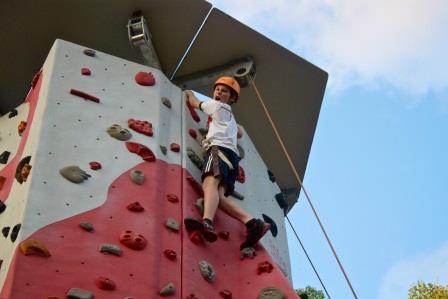 Alumni Socials Each spring and fall, we try to hold at least one Alumni Social in Montreal, Ottawa and Toronto. It is always great to renew with recent and less recent alumni. The next opportunity to re-connect will be in the spring. Dates and locations of future get-togethers will be posted on Facebook on the Nominingue Socials Group page. To get involved with CN Alumni Association, please contact John Christou at john@prospectorfilms.ca. Tumpline Submissions - Soumissions pour cette lettre de nouvelles
We are looking for submissions for our newsletters from campers, staff and parents… from this summer, as well as from recent and less recent alumni. These submissions may be general memories of camp experiences or specific memories about a canoe trip, about a favourite program or a funny experience. Please send your submissions to grant@nominingue.com. You may submit your stories and memories in English, French or Spanish.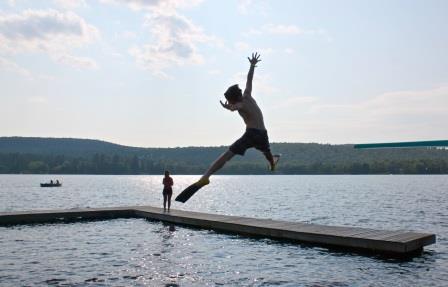 Nous sommes à la recherche de textes de campeurs, parents et de moniteurs de l’été 2014… et de souvenirs de nos anciens campeurs et moniteurs des années récentes et moins récentes. Vos textes peuvent décrire vos expériences en générale ou une excursion de canot, un programme favori ou une expérience drôle. SVP envoyez votre texte par courriel à grant@nominingue.com. Votre texte peut être écrit en français, en anglais ou en espagnol. |
|
|
Camp Nominingue | Tel. 450-267-2555 | Toll-free 866-910-1551 (Canada & US)
Email: info@nominingue.com | Web: www.nominingue.com |
|
|
This e-mail is destined to all campers, parents and counsellors, current and alumni. If you would prefer not to receive occasional messages from us, please unsubscribe using the link below this message.
Ce courriel est destiné à tous les campeurs, parents et moniteurs, actuels et anciens. Si vous voulez vous désinscrire de cette liste d’envoi, svp cliquez en bas de la page.
Camp Nominingue
Winter Address: 112 rue Lippée, Les Coteaux, QC J7X 1J4 Summer address: 1889, chemin des Mésanges, Nominingue, QC J0W 1R0 |
|